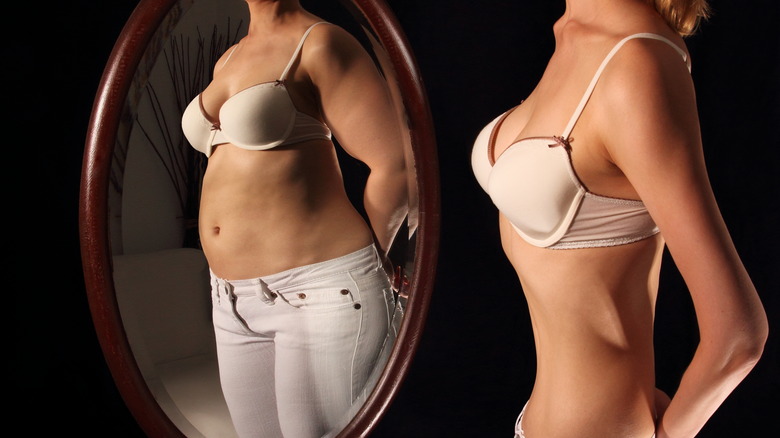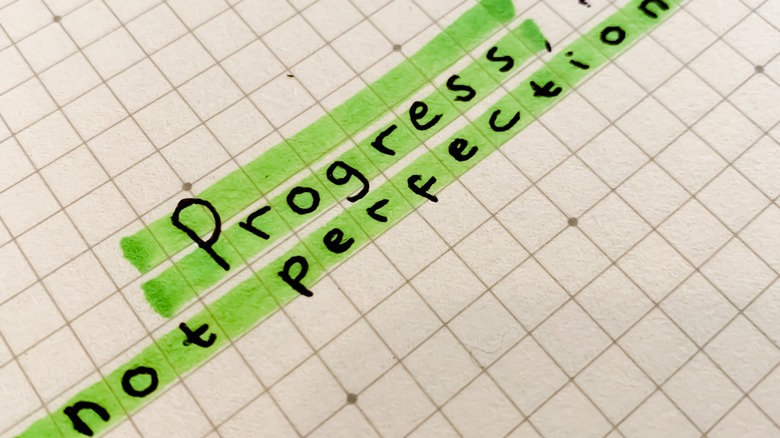Why We Should Reject The Return Of 'Heroin Chic,' According To A Wellness Coach
The female form has long been used as a "cultural artifact" of sorts — an ever-evolving reflection of whatever our culture deems "worthy" at any point in time. In a 1991 article published in Women's Studies International Forum, Sharlene Hesse-Biber explains how cultural pressure for women's bodies to become smaller, for example, often comes during times when women are asking for more room at the political, social, or economic table.
Perhaps even more disturbing is what theorists have identified as the driving force behind this correlation: the male gaze. A 1998 study published in the International Journal of Eating Disorders found that during periods of cultural transformation, when women were seeking higher education and contributing to the economy on a greater scale, men's preferences shifted from curvaceous bodies to more slender, meeker-looking ones. And we're seeing this again now: As women fight for their reproductive rights, the "New York Post" published an article entitled, "Bye-bye booty: Heroin chic is back" (per Verywell Mind).
In the 90s — when grunge ruled the airwaves and emaciated models were plastered on every billboard and magazine cover — "Heroin Chic" became the counterculture of "cool." But what was painted as a deviation from the media's demand for physical perfection was anything but (per University of Michigan). In an exclusive interview with Health Digest, Sonia Jhas, Mindset and Wellness Coach, and author of the forthcoming book "I'll Start Again Tomorrow (And Other Lies I've Told Myself)" explains why we should be vehemently rejecting the revival of the "Heroin Chic" aesthetic.
90s 'Heroin chic' promotes disordered eating
"The 'Heroin Chic' trend romanticizes extreme thinness and emaciated features. [It] encourages intensely thin physiques, pale skin, and a general air of exhaustion — the kind of look achieved through drug use or eating disorders," Jhas explains. "I think it's clear that these are not healthy options. Obsessive body-checking, excessive exercising, extreme deprivation ... this trend encourages us to achieve the "ideal" body through soul-sucking and health-sapping behaviors."
She points out that this glamorization of unhealthy bodies sends a clear message to women: If you want to be beautiful, you must abuse your body. " It tells us that we need to look a certain way and be a certain size, in order to feel happy. But really, following this trend will only make you tired, discouraged, and hungry. Trust me, I tried it."
Jhas paints a picture of her teenage self: "Surviving on minimal food, running on the treadmill for hours, depriving myself until I couldn't stand it anymore. I'd eat everything in sight, then shame-spiral, and the cycle would start all over again. It was exhausting. It was lonely. I was hungry."
How heroin chic will impact younger generations
In recent years, we've watched as the Kardashians' — with their voluptuous bodies — helped to move society away from these ultra-thin ideals. Celebrities like Lizzo and Jameela Jamil have been loud and proud proponents of the body positivity movement, empowering women to love their bodies at every size. But Jhas fears that the revival of 'heroin chic' will hit the younger generation harder than it could have ever hit us.
"I can only imagine the intensity of messaging young people today are facing — they're bombarded with images and messages promoting 'heroin chic' across social media. It felt overwhelming in the 90s, seeing these wafer-thin models and actresses on TV or in magazines, and I didn't even have social media to contend with," she says. "After giving body image issues and eating disorders to basically an entire generation in the 90s, you'd think that we'd know better by now. But somehow, we're letting this trend creep back in, and these harmful messages are filling our young people's feeds, impacting their self-perception and self-worth."
Rejecting unhealthy influences with core values
If we have any chance of shutting this thing down, Jhas says we have no choice but to unequivocally define our personal values. "Get clear on YOUR Values. Trends should not have the power to dictate how we feel about our bodies. Getting clear on your values — the beliefs that are most important to you, at your deepest, core level — will help you block out the noise of external influences. Values drive our goals, our decisions, and our actions. When we live according to our values, we experience a sense of groundedness, calm, and peace of mind."
Defining your values may seem like a daunting task, but Jhas recommends an exercise to help you begin. "To start the exploration process and get a sense of what your core values are, ask yourself: What brings me the most joy? What gives my life meaning? What makes me come alive? What am I truly focused on? If you can articulate answers to these, you'll likely begin to see a pattern that you can boil down into a single theme."
"Refocusing your body image through the lens of your core values will allow you to get clear on what you actually want and what you actually need," Jhas explains. "They'll help you to build a sturdy structure of self-compassion and self-love so that when damaging narratives like 'heroin chic' start trending, you can ground yourself in what truly matters."
Setting realistic and healthy goals
Establishing your core values can also improve the way you make decisions pertaining to your health and wellness goals, Jhas reveals. " When we set goals that are informed by what's most important to us, we're able to take action that no longer feels draining. Establishing both short-term and long-term goals allows you to stay focused and helps you override negative narratives. You'll move away from the abstract and elusive goal of "skinny" and begin working toward something concrete. You'll also have something tangible to benchmark yourself against, enabling you to course-correct at every turn. It's a simple, but powerful, mechanism."
One way to do this, Jhas clarifies, is by moving away from weight-related goals in favor of performance-oriented goals. "These performance-based goals shift the focus from size to strength. Once you start to see progress in the health department, you'll start to care less and less about the size department. You'll want to eat for performance, sleep for performance, and hydrate for performance."
Progress, not perfection
"The chase for perfection is never-ending," says Jhas. "The time, effort, and obsession required to inch closer to the perfect body feel great at first, but it becomes truly exhausting after a while. Say it with me: A body you love is not worth a life you hate."
Jhas reminds us that the quest for physical perfection is a futile one. "Perfectionism twists and manipulates the way that you think about food, your body, and yourself, and ultimately, you just can't keep up. When you put so much pressure on yourself to achieve perfect track records and perfect scenarios and perfect outcomes, you actually rob yourself of success. When perfectionism is driving you, there's just no way to get out of the vortex."
As an alternative, she recommends shifting the focus and relinquishing some of that control. "Instead of pushing yourself impossibly hard and demanding growth through the mastery of perfection, maybe you begin learning to trust and surrender. Maybe, you let go of your need for control. You can learn how to prioritize progress over perfection." In doing this, Jhas says we can start enjoying the ride rather than rushing to some self-imposed finish line.
"Celebrate your body for all that it does and all that it can learn to do. Cultivate the skills and strength that you want to gain. Embrace the work instead of hoping for a miracle fix. Ground your actions in your core values. Give yourself a real chance to form positive habits and resolve not to give up two weeks later when "nothing is happening." Evaluate your progress week over week and ask yourself, "Am I getting stronger? Do I feel better?" And at each step, remind yourself that this time, it's about progress, not perfection."
To learn more about Sonia Jhas, visit her website, or keep up with her on Instagram and Facebook.






